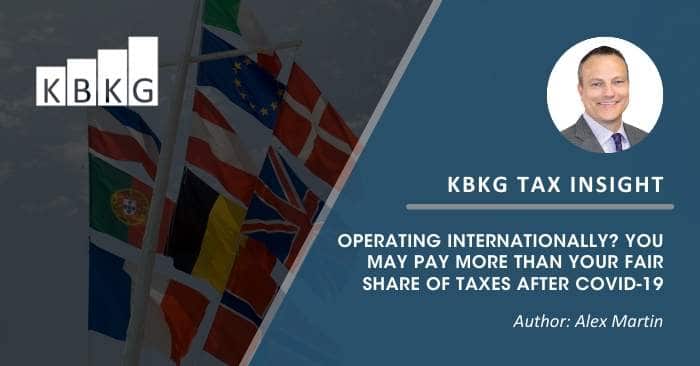Even in a pandemic, multinationals may be surprised to receive a tax bill for their overseas operations, but there may be a silver lining.
Ben Franklin is widely credited with the quote, “In this world, nothing can be said to be certain, except death and taxes.” With a pandemic, some companies with cross-border operations expect a temporary reprieve on the tax side, but auditors may have different ideas. Why? Multinationals are regularly accused of not paying their fair share of taxes – pandemic or not.
For multinationals, the transfer prices charged drive how much income tax is paid by country, or how tax losses are allocated. If tax auditors anywhere adjust transfer prices, a company can incur substantial additional tax, late payment interest, and nondeductible penalties, along with double tax.
Why would governments expect tax during a pandemic?
With government budgets already stretched, generating additional tax from multinational companies is an attractive option. A tax auditor may not know much about your business, but they do know how much income tax was paid.
We anticipate many tax authorities will assert that companies acting at “arm’s-length” under transfer pricing regulations would negotiate changes in pricing during a pandemic, especially while auditing foreign-owned subsidiaries. Under this thought process, the parent company effectively would be insulating subsidiaries from losses. In practice, auditors will argue that parent companies are better positioned to bear the risk and financial burden of a pandemic than subsidiaries.
Why target subsidiaries? We just had a bad year (or more) in our foreign market.
Losses for subsidiaries of multinational companies are usually red flags for governments. As an example, recently issued policies include an IRS audit campaign specifically targeting foreign-owned distribution companies. Moreover, the Australian Taxation Office published their expectations for industry distributor profitability for use in prioritizing audit targets. We do not expect a change in approach for loss-making companies
How can companies mitigate this risk?
For COVID affected industries, gathering documentation that show losses are commercial and that independent companies would share losses in a similar situation is important during an audit:
- Management estimates of pandemic-driven losses help demonstrate how much of a loss is commercially driven, rather than a problem of transfer pricing.
- Do company suppliers or customers normally share in the risk of losses during a downturn in the business?
- Do third-party contracts allow price renegotiations in the event of a force majeure event such as a pandemic?
- Do company intercompany contracts permit changes in transfer prices during a business downturn or a force majeure event?
- Does a company’s transfer pricing documentation explain how companies share risks during a market downturn?
Preparing transfer pricing documentation prior to an audit, places taxpayers in a stronger position to counter standard tax auditor strategies.
The CARES Act – Wait . . . Could there be tax savings here?
Under the Coronavirus Aid, Relief, and Economic Security (CARES) Act, US corporations can now elect to carryback losses incurred in 2020 for a five-year period (2015 to 2019). Prior to the CARES Act, US corporations could not carryback losses as a result of US tax reform. Companies that have tax NOLs in the US during 2020 now have the opportunity to carryback losses against income previously taxed. The cash savings can be as high as 35 percent when electing to apply tax NOLs for profits earned in years prior to US tax reform.
KBKG Insight: From a practical perspective, US tax NOLs are more valuable after the CARES Act for many companies; and transfer pricing strategies often have an impact on where tax NOLs are generated. Where appropriate, strategic tax planning may help companies improve their return on tax NOLs, while simultaneously reducing the risk of transfer pricing audits in overseas tax jurisdictions.
In a future article, we will provide a more in-depth assessment of the CARES Act and transfer pricing cash savings opportunities. There are numerous considerations when assessing the cash impact of the CARES Act and transfer pricing changes, however, the potential value of optimizing losses could be substantial.
Bottom Line
Multinational companies may be surprised by a transfer pricing audit during a pandemic. Governments globally are hungry for revenues, and transfer pricing audits continue to be a productive use of their time. Losses incurred by subsidiary companies are red flags for tax auditors. However, multinationals that do generate US tax NOLs during 2020 may be able to recover cashflow.
Where can I go for additional questions?
If companies or CPAs have questions about Transfer Pricing, KBKG’s Principal and Practice leader, Alex Martin, is here to assist. » Schedule a call now
KBKG also has many resources on our website to help you answer any other questions not listed here. » Learn about Transfer Pricing
Register for our Transfer Pricing after Tax Reform and COVID Webinar
For additional information, join us for a free webinar on transfer pricing presented by Alex Martin.
Author: Alex Martin
About the Author
 Alex Martin – Principal
Alex Martin – Principal
Midwest
Alex Martin is Principal and Transfer Pricing Practice leader at KBKG, operating from Michigan. He has 22 years of full-time transfer pricing experience working in Washington, D.C.; Melbourne, Australia; and Detroit, Michigan over the course of his career. Alex has assisted companies in many industries addressing transfer pricing issues on a US and global basis. » Full Bio



